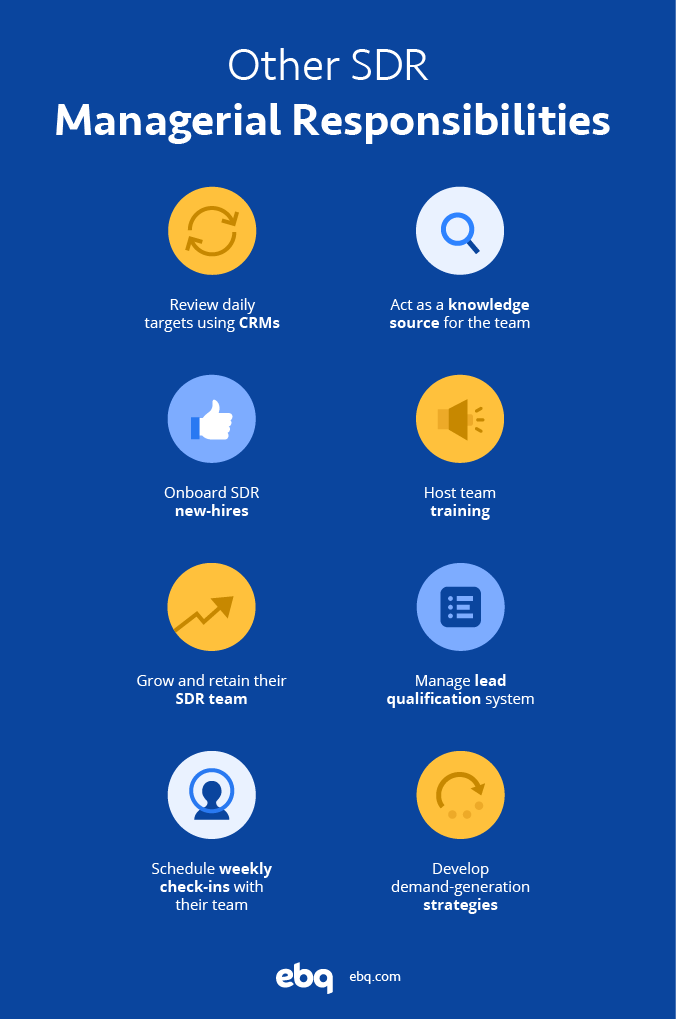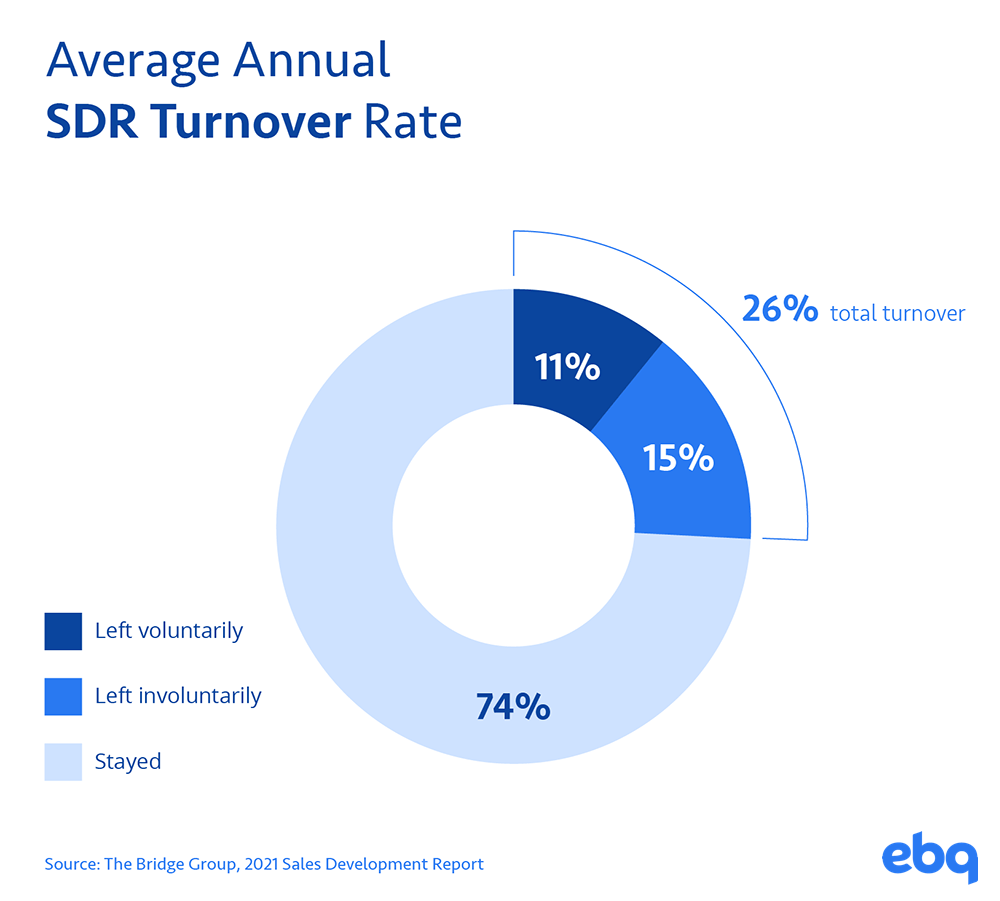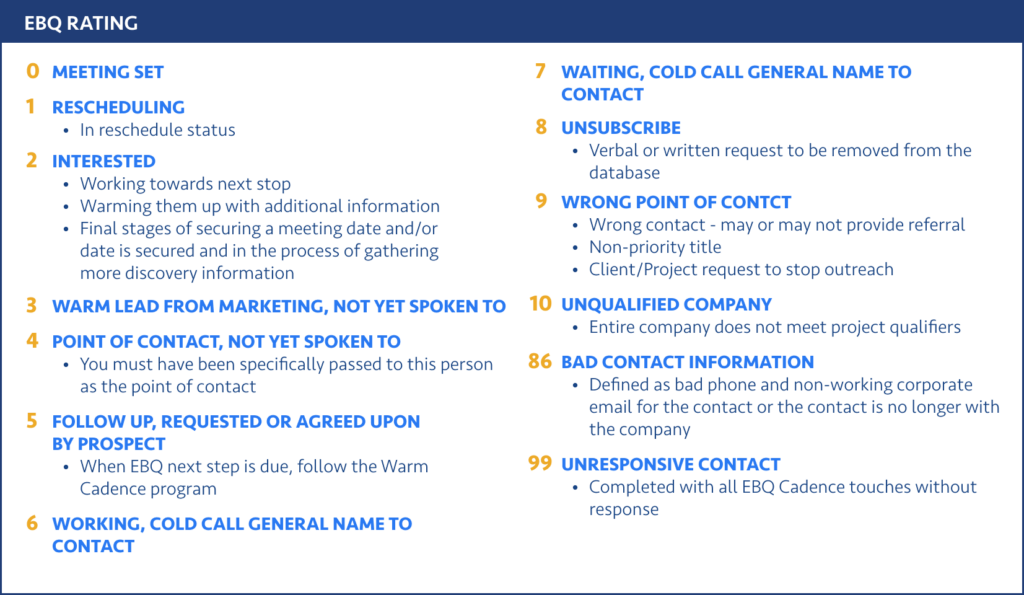How to Hire a Successful SDR Manager: Job Description, Interview Questions, Training, and More


Stuart Bontrager
The sales development process involves identifying, engaging, nurturing, and converting potential customers into paying clients. To optimize your sales development process, hiring the right sales development representative (SDR) manager is key.
Since SDRs are often entry-level positions, they’ll need a manager to guide the team and mentor them into their sales role. Studies have shown that almost 75% of SDRs have less than 6 months of sales experience — meaning they‘ll need more guidance.
Without proper management, your sales development process can run ineffectively. Therefore, it’s critical that you hire the right SDR manager to manage your sales development team.

WEBINAR REPLAY:
How to Hire and Build a High-Performance SDR Team
Follow along with our presentation to discover key strategies to hire, train, and retain your best SDRs.
What is an SDR Manager?
An SDR manager, also known as a business development manager, helps their team hit their sales development goals as they continue to look for ways to optimize the sales process. Like any manager, the SDR manager is also expected to act as a liaison between their team and upper management — training their team on best practices and directing them towards new goals.
Other responsibilities include:

- Review daily targets using CRMs
- Schedule weekly check-ins with their team
- Grow and retain their SDR team
- Onboard SDR new-hires
- Host team training
- Act as a knowledge source for the team
- Manage lead qualification system
- Develop demand-generation strategies
Review daily targets using CRM dashboards
An SDR manager is responsible for keeping their team accountable to current appointment setting goals. To do this, your SDR manager must be tech-savvy enough to fully utilize your CRM investment to gather data-driven insights.
Based on these insights, the SDR manager will build reports and make sure everyone on their team meets their appointment setting goals.
If you haven’t already, utilizing a CRM is a robust way to unify customer data and track daily progress. For more information on the benefits of a CRM investment, be sure to check out our Beginner’s Guide to CRM.
Scheduling weekly check-ins with their team
Your SDR managers need to touch base with their team members through regular check-ins in both an individual and team setting.
Productive one-on-one meetings allow your SDR manager to identify individual roadblocks in a more intimate setting. From there, your manager designs personalized training materials to help each SDR overcome their challenges — such as conducting roleplays.
These conversations also help SDR managers identify patterns that plague their team and address them in a team setting.
We’ve found that weekly team meetings allow your SDR managers to disseminate important company updates, team progress, and other important information efficiently. Your managers can also use this time to gamify training to help their team retain best practices.
Growing and retaining their SDR team
Your SDR manager is in charge of growing your SDR team, so they need to fully understand what to look for in an SDR candidate.
But it takes more than just finding the right fit to retain your SDR team. Studies show that companies lose an average of 26% of SDRs annually — meaning your SDR managers need to find creative strategies to reduce SDR attrition.

Because retaining the internal SDR team is often a challenging process, many turn to outsourcing their SDR department. This protects companies from turnover effects, as the outsourcing company is responsible for scaling their SDR team to fit client needs.
Host team training sessions
Hosting training sessions helps upskill a lot of your SDRs at once. There, you can go over appointment setting best practices, industry trends, and even discuss new strategies to optimize the current sales development process.
Your SDR manager should be in charge of designing these training sessions by identifying common weaknesses, creating lesson plans, and conducting training sessions. We’ll go over how to design these effective coaching sessions later on in the post.
If you are working in a remote setting, your SDR team can still benefit from live training. Check out our post on “How to Train Remote Employees & Upskill Your Workforce” to learn expert tips on upskilling your team from your home office.
Act as a knowledge source for the team
SDRs are often very green in their sales career. This means you’ll get a lot of excited and enthusiastic new hires who are eager to prove themselves; you’ll want to put this energy into good use.
Your SDR manager needs to be your reps’ go-to person to answer any questions and become a soundboard for new ideas. The SDR manager has to therefore maintain your standards while actively removing roadblocks for their team members.
Manage lead qualification systems
A lead qualification allows your SDRs to objectively evaluate leads using a quantitative scoring system.
These scores are derived from behavioral triggers: an action your lead takes to engage with your brand. Depending on what the leads interact with, their scores predict how interested the prospect is in buying into your solution.
Your SDR manager is in charge of regularly evaluating how effective your lead qualification has been. From there, they’ll make recommendations based on available data to improve the lead qualification system.
Creating a lead qualification system is the backbone of your sales development process — especially when you have a lot of prospects to comb through. At EBQ, we use our own EBQ Rating.

The EBQ rating is a manual scoring system that rates how warm a prospect is based on their behaviors. The most important aspect of lead qualification is using a consistent lead qualification system across your organization. For more information on lead qualification, visit our “Lead Qualification Process” post.
Develop demand generation strategies
The sales development process only plays a part in the overall demand generation system. Demand generation is the act of drumming up interest in your solution through both inbound and outbound efforts.
Your sales and SDR leaders need to come together to align the SDR/AE team. From there, they need to work with marketing stakeholders to review similarities between top buyers. This will inform your buyer personas, which will ultimately guide your sales strategy to pursue high-quality leads.
These main job responsibilities prove that finding the right SDR manager can be a daunting task. Luckily, our sales experts have identified the top traits you should look for when looking to fill your SDR manager role.

WEBINAR REPLAY:
How to Hire and Build a High-Performance SDR Team
Follow along with our presentation to discover key strategies to hire, train, and retain your best SDRs.
How to hire a business development manager?
Hiring a fully burdened SDR manager can be difficult. Not only do you have to vet out their hard skills, but you also have to make sure the candidate is a cultural fit for your organization.
To start, we recommend identifying what skills and traits you’re looking for in this role.
For us, we want people who know and excel at:
- Time management
- People relations
- Communication
- Being process oriented
- Listening
- Creative problem solving
As mentioned earlier, an SDR role is often an entry-level gig. That’s why you’ll need someone with experience in sales, marketing, and/or customer service to fully understand how to lead an SDR team. You’ll also want someone who is tech-savvy so they can fully utilize the expensive tools you’ve invested for them — such as CRM, sales automation, and marketing automation software.
Because it’s such a costly process to hire an SDR manager and build a team from scratch, many turn to outsourcing their SDR department. That way, organizations still benefit from the management layer without needing to worry about onboarding, training, and retaining their SDR team.
Example SDR manager job description
To attract the right candidates, you’ll need to make sure your job description accurately reflects the job functions.
Here’s what we look for in an SDR manager:
Position Summary
- Responsible for developing and nurturing client relationships
- Call monitoring and coaching assigned team members on sales processes, best practices, and applicable tools
- Must have relevant experience in customer service and judgment to accomplish goals
Example Responsibilities
- Effectively build and manage a lead generation pipeline
- Effectively communicate via phone and email
- Demonstrate mastery of discovery and qualification criteria
- Assist department director in managing, retaining, and growing customers and team members
- Run new customer kick-offs with the Success Manager
- Prepare and manage project CRMs, reports, and dashboards
- Monitor and communicate the performance and behavior of assigned team members and project status to the department director
Minimum Qualifications
- Mastery of sales process and applicable tools
- Self-starter
- Proven ability to communicate and coach other specialists
- Proven sales development experience
- Process-oriented
- Work effectively in a collaborative environment
While finding someone who can perform all the hard skills is important, it’s also pertinent to hire someone who’s the right cultural fit for your organization. After selecting a few candidates who may be the right fit on paper, it’s time to meet these top applicants.
SDR manager interview questions
You found someone who’s great on paper. Now, it’s time to see what the synergy looks like.
When interviewing for your SDR manager position, make sure you’re asking a mix of hard and soft-skill questions. That way, you’ll make sure you’re finding the right person with the right skill set and who is the right fit for the team.
A few examples of hard-skill questions we like to ask are:
- Walk me through the process of converting a lead into an opportunity.
- How do you prioritize your leads?
- Do you have any experience in [your organization’s company software]?
Soft-skill questions are great for vetting people to make sure they have the right synergy to work with your existing team. These skills are often called transferable skills — as these skills can be beneficial for any job function.
A few soft skills questions you can ask include:
- How do you handle internal team conflict?
- If an SDR is struggling with their quota, how will you upskill them?
- Walk me through your process of creating a training program
At the end of the day, you’re looking for someone you can rely on to hire, retain, and upskill your SDR team on your behalf. If you’re struggling to build a successful team and hire an effective team leader, consider outsourcing your appointment setting department.
One of the biggest benefits of outsourcing is that you’re no longer solely responsible for the sales development process. By leveraging an expert’s proven process, you’ll boost your shot at attracting only high-quality leads into your sales pipeline.
SDR Training
Just because you’ve hired the right person for the job doesn’t mean your work stops here. Now, focus on upskilling your workers to boost their productivity through workshops and training.
Your goal with these training programs becomes two folds:
- Continue elevating your manager’s leadership skills
- Nurture current employees’ skill level
Creating these 2 distinct company training is not just a way to help your SDR team grow. From our experience, offering proper training is a great way to boost job satisfaction within the SDR department.
SDR manager training
SDR managerial training allows you to continue to help your managers grow into their role. You should give direct pointers on not only how to direct the sales development strategy, but also how to lead their people as well.
To do so, you’ll need to coach your SDR managers. They need to be trained on how to maximize your team’s investments — including CRMs and sales/marketing automation tools.
You can even create roleplays: a way to emulate real-life scenarios an SDR manager may face. They can then work out an effective way to make their SDR team feel heard while protecting your organization’s best interest.
Sales development representative training
If your organization wants to promote from within, then we recommend creating promotional training.
As the name implies, promotional training allows you to teach SDRs the skills they need to take their careers to the next level. Each session can go over different topics of what makes a good manager.
The goal is to be able to promote from these cohorts to fill your open SDR manager position when that opportunity comes.
Hire the right SDR manager for your org
Screening and onboarding the right SDR manager makes all the difference. Not only will your SDRs gain a mentor, but you can also boost your sales development productivity.
Finding the right person takes more than just putting a job posting on career sites. You’ll also need to understand the scope of their responsibilities, identify skills and traits to be successful, and even ask the right questions to find the best fit.
Unfortunately, this is going to be a costly process. It’s why many choose to outsource their cold calling team. This offloads the burden of hiring, onboarding, retaining, and upskilling the sales development team for the organization. If you’re in search of an experienced team of SDRs and managers to build your department, our appointment setters are just one call away.

WEBINAR REPLAY:
How to Hire and Build a High-Performance SDR Team
Follow along with our presentation to discover key strategies to hire, train, and retain your best SDRs.

